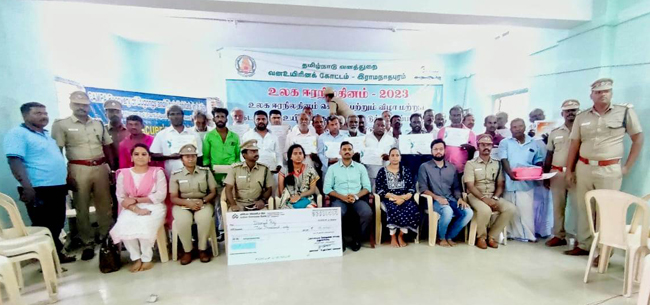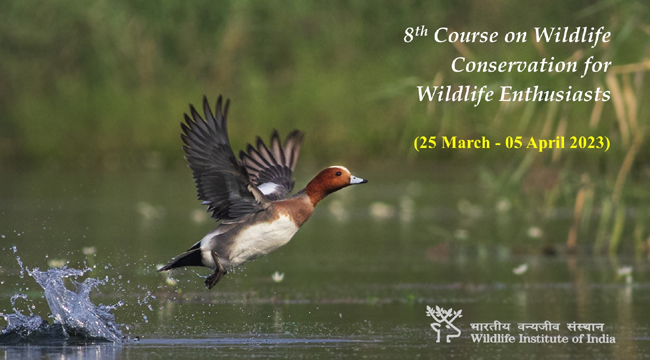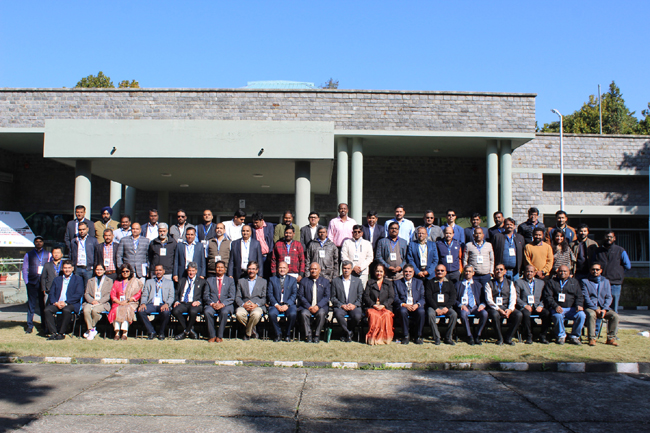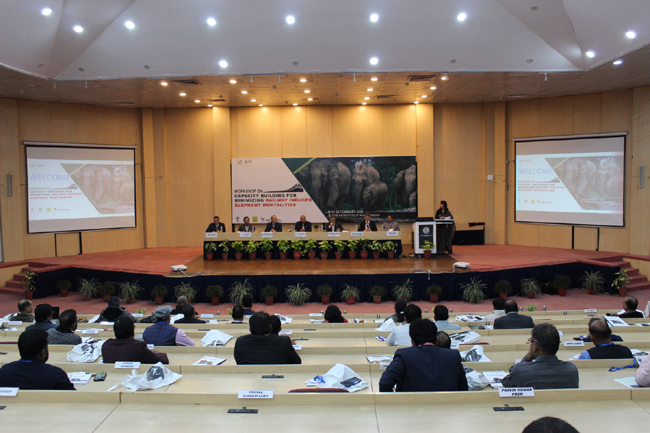February 2023
VIII Course on Wildlife Conservation for Wildlife Enthusiasts (27 March –05 April 2023)
|
The Wildlife Institute of India (WII) intends to conduct the VII Course on Wildlife Conservation for Wildlife Enthusiasts from 27 March to 05 April 2023. Professionals without any formal training and experience in wildlife biology/conservation will be given preference in the course. The course will involve five days of classroom sessions at WII followed by a five-day field visit to a Protected Area near Dehradun. The total number of participants in the course will be 20. The training fee for this course is Rs. 35,000/person (Rupees Thirty-Five Thousand only), which includes cost towards food and accommodation at WII and field site, and travel to the field site and back. At WII accommodation will be provided on twin sharing basis and at the field site it will be in tented/Forest rest house accommodation. Applications are invited from interested candidates, which should include a copy of their C.V. and a brief write-up explaining their motivation to participate in this course as per the prescribed format. Selection of candidates will be based on their write-up and C.V. Applications should reach the Course Director Dr. R. Suresh Kumar, Scientist – E, Department of Endangered Species Management by email (suresh@wii.gov.in) no later than 28th February 2023. The shortlisted candidates will be informed about their selection for the course by 5th March 2023. Selected candidates will be required to sign an indemnity bond at the time of joining and are required to be medically fit. The participants will also be given a certificate of participation at the end of the course. Course details: The course will include lectures by WII faculty and experienced researchers covering Indian biogeography, wildlife conservation issues and strategies across the country, science and management of large mammal populations, illegal trade of wildlife parts and role of forensic science, managing wild animals in distress, the importance of citizen science initiatives. There will also be a few evening lectures on select conservation projects being carried out by WII. The field visit will include a five-day trip to a Protected Area (PA) near Dehradun. The participants will be taken on long treks to various places and will camp within the PA. During the treks, the participants will be introduced to natural history observations, jungle crafts etc. “Wildlife Watch” will be an integral part of this course. The resource persons will also talk to the participants in the field about wildlife management and habitat restoration, estimation of the tiger population, socio-economic issues, and challenges facing PA managers. During the first week of the course, the participants will also be taken on a day-long trip to nearby Conservation Reserves and National Institutes for interaction with site managers/scientists. |
|
| Plug-in: Download Adobe Acrobat Reader |
Last Updated: February 28, 2023
Capacity Building Workshop on Minimizing Elephant Mortalities on Railway Track for Officials of Indian Railways at Wildlife Institute of India
|
To reduce the impact of railways on our wildlife, it is important to build the capacity of our railway sector by sensitizing railway officials towards India's rich biodiversity and the various mitigation options available to avoid human-wildlife conflict and accidents. In this regard, the Project Elephant Division of MoEF&CC and Elephant Cell, Wildlife Institute of India organized a three-day capacity-building workshop on Minimizing Elephant Mortalities on Railway Tracks for Officials of Indian Railways. As the Workshop's chief guest, Sh. S.P. Yadav, Director General of the MoEFCC's tiger, elephant, and forest conservation projects, emphasized the importance of striking a balance between conservation and development for our country's sustainable growth. He emphasized how it has been challenging to give straightforward and clear recommendations for mitigating railway-wildlife accidents until now due to the lack of capacity building for the railway sector. Shri Arun Kumar Khandelwal, Principal Executive Director, Gati Shakti, Railway Board, reiterated the Indian Railways' dedication to integrating environmental concerns with its growth initiatives. Sh. Virendra Tiwari, Director, WII, said that the outcome of the program would help guide responsible railway development in consonance with the conservation of elephants and other wildlife in India. 41 officials from various railways departments and training institutes participated in this capacity-building workshop. India is a megadiverse country, with only 2.4% of the world's land area, but accounts for 7-8% of all recorded species of the world, including about 91,000 species of animals and 45,500 species of plants. India is also the second-most populous country in the world with a population of over 1.3 billion people! To transport and cater to the needs of such a large population, the Indian Railway is the main artery of inland transportation in India. The Indian Railways is at the core of India's economic development and is among the world's largest rail networks. To cater to India's fast-growing economy, the railway sector has envisaged several expansion and upgradation projects including Vision 2024 to achieve targets of 2024 MT freight loading by 2024. The railway also aims to electrify the entire network by 2023. Recognized as economic, energy-efficient, and environment-friendly relative to other means of transport such as roads and air, the expansion and upgrading of railways is seen as an important measure in supporting development through large-scale movement of people and goods. However, railway construction and operation has its ecological effects, and a range of impacts on wildlife and habitats have also been documented. Several of India's passenger and freight trains crisscross through some of the country's most sensitive wildlife habitats, particularly protected areas and corridors in central and eastern India that are home to critically endangered tigers and elephants, amongst other animals. The extensive network of our Railways cuts through several of these forested landscapes, compromising the connectivity of the landscape and resulting in a barrier effect. India is home to the largest number of Asiatic Elephants, accounting for nearly 60% of the jumbo population. According to a 2017 estimate, India had a total of 29,964 wild elephants. India has 32 elephant reserves covering around 76,508 sq km area across 14 states of the country. But studies have shown that 30 percent of the country’s wild elephants live in large and contiguous forests, while the rest are distributed across fragmented landscapes that have shrunk amid growing human activities, including cultivation. With the expansion of cultivated land along forest boundaries, elephants are increasingly being drawn to forage for crops such as maize, millets, paddy, sugarcane, and vegetables. Among the states, Karnataka had the highest wild elephant count in India at 6,049 followed by Assam at 5,719, Kerala at 5,706, and Tamil Nadu - at 2,761. If we take ten years, 186 elephants were killed on railway tracks between 2009-2010 and from 2011-2021. Among states, Assam had the highest number of elephant deaths due to train hits with 62 deaths, followed by West Bengal at 57 and Odisha at 27. Over the past five years, India has lost 494 elephants to train accidents, electrocution, poaching, and poisoning. Train accidents accounted for 80 of these deaths. While 494 deaths over five years appeared to be a fraction of India’s estimated population of nearly 30,000 wild elephants, such deaths could disrupt herd dynamics and further enhance the risk of human-elephant conflicts. The loss of a single older elephant in a herd is the loss of experience for the others in the herd. The older members in the herds guide the younger ones. In their absence, the younger ones could stray into human-dominated landscapes, increasing human-elephant conflict. India is a rapidly developing country, and our railway system is an integral part of that growth and expansion. However, with this progress comes the challenge of preserving our precious wildlife, particularly the Indian elephant, which is an emblem of our rich heritage and culture. The sad reality is that elephant-train collisions have become increasingly frequent in recent years, causing harm to both the elephants' and human lives. It is imperative that we take a collaborative approach to tackle this problem and ensure the long-term survival of these magnificent creatures. Further Contact Dr. Bilal Habib 9410992233 Dr. Parag Nigam 9412974486
|
|
|
|
|
Last Updated: February 4, 2023
Felicitation of the rescuers on the occasion of the World Wetland Day
 |
|
| Three dugongs trapped in the net were rescued and released safely by the joint efforts of fishers at Mookaiyur, and Naripaiyur, Ramnad District, Thoothukudi Wildlife Range in Tamil Nadu. 19 Fisher's efforts have been recognized and complimented by the Tamil Nadu government on 2nd February 2023 at Thangachimadam Government Higher Secondary School, Tamil Nadu. The WII CAMPA Dugong Recovery program, along with the Chief guest, Mr. Jagdish Sudhakar Bakan, IFS, Wildlife Warden, District Forest Officer, Ramanathapuram district, Miss. Gayathri Usman, Kadal Osai FM, and Range Forest officers from Tuticorin and Madapam range have awarded these fishermen's each team a cash prize of Rs. 10,000 each, a certificate, a medal, and a Dugong souvenir. | |
Last Updated: February 4, 2023




 (49.32 kb)
(49.32 kb)








